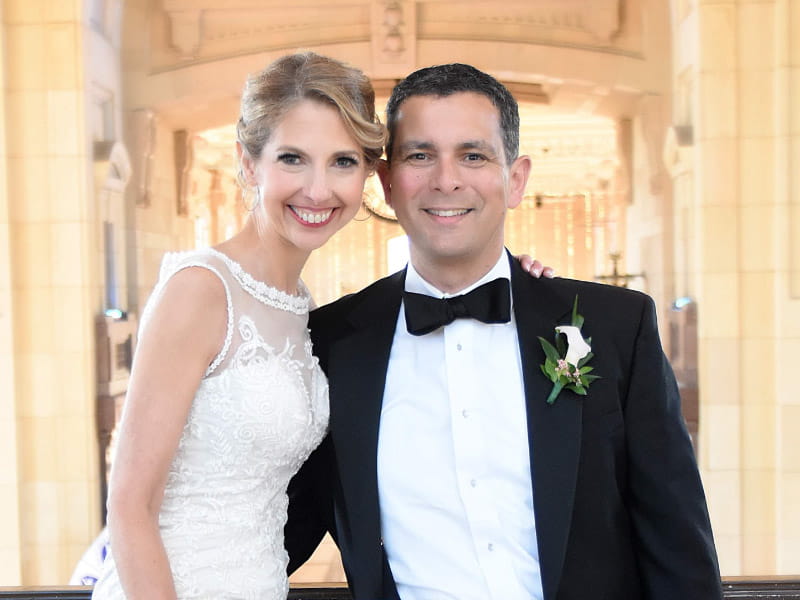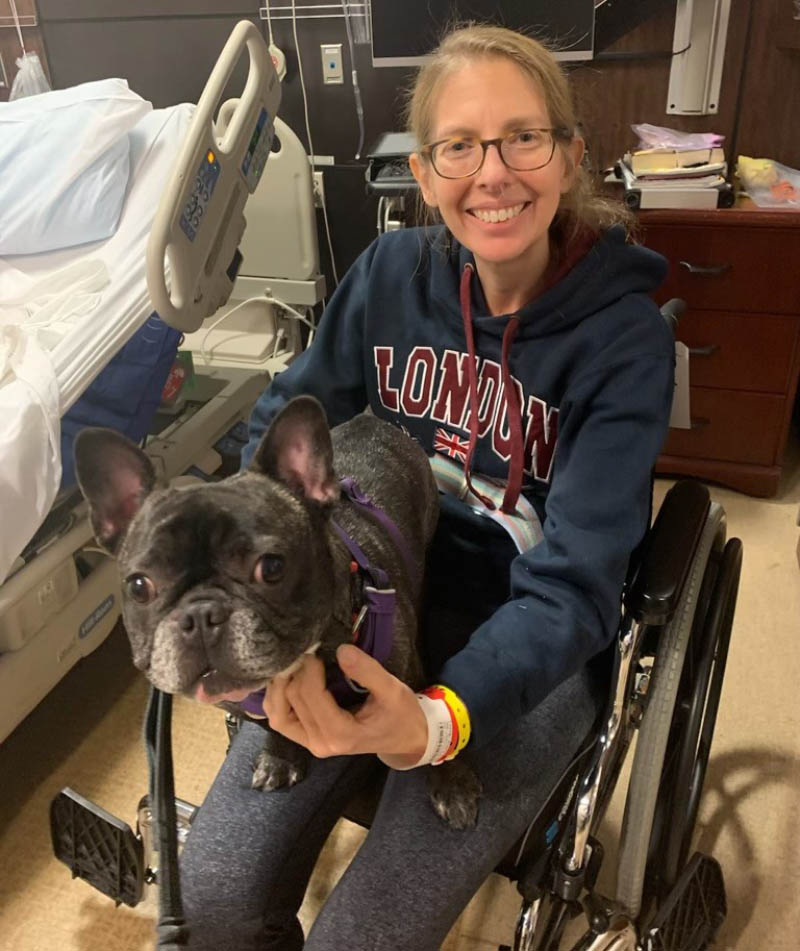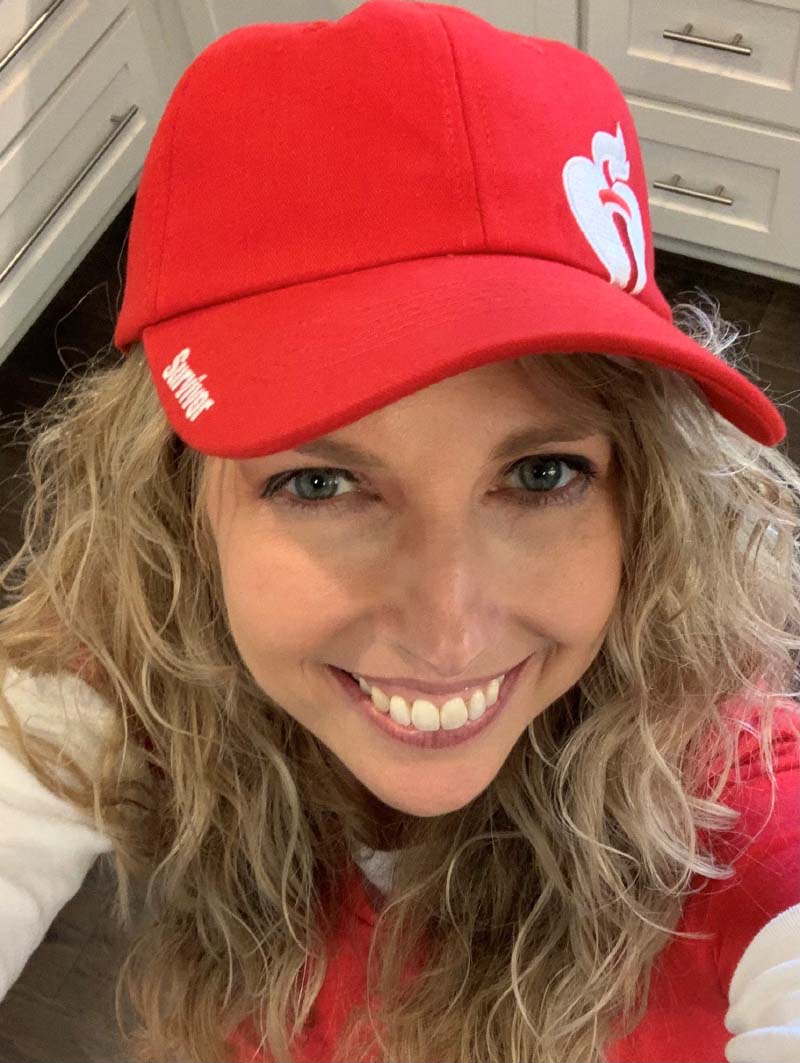Could her heartburn, she wondered, be a symptom of a heart attack?
By Leslie Barker, American Heart Association News

The day Angie Loving married Sam Abadir, she was on the list for a heart transplant. It was Feb. 29, 2020, three months after she survived a massive heart attack. She was still relearning seemingly simple givens of life like how to eat, speak and walk; still dealing with ensuing blood clot issues; still working through daily therapy.
But while she may have been unsure of what medical procedures and surgeries lay ahead, she was sure of one thing: marrying Sam.
"I knew life wouldn't be the same as it was before my heart attack on Nov. 14 the year before," Loving said, "but I couldn't imagine life without Sam. I knew that, together, we were stronger than ever."
That fateful fall Thursday, Loving had been looking forward to leaving the chill of Lawrence, Kansas, the next day for the sunny warmth of Florida for a vacation with two high school friends.
She had lots to do to get ready. When she began feeling a hint of indigestion, she attributed it to the pizza and wine dinner she and Abadir, her then-fiancé, had shared the previous evening.
As the day progressed, her skin started feeling clammy and the nausea more intense. Active and healthy at 46, Loving wondered if her symptoms could possibly signify something more.
She remembered reading that heartburn can be a symptom of a heart attack, so she checked the American Heart Association's website, which confirmed her suspicions. She decided to drive herself to the nearest emergency room, less than 2 miles away. "Maybe they can tell me I'm crazy and I'll get to go to the beach," she thought.
The decision to go to the hospital saved her life, but she almost didn't make it to the ER at all. She passed out while driving, veered across four lanes of traffic, and hit a stop sign. When she regained consciousness, she knew she was going to be sick. A police officer witnessed what happened and asked if she needed help.
"I'm having a heart attack," she said. "Call 911."
In the hospital, tests showed she had had a severe heart attack. Doctors inserted three stents to clear the blockage. Loving was then moved to a larger hospital, one with a more sophisticated cardiology team and equipment.
There, doctors broke the news to Loving and her family that she needed a heart transplant. She was put into a medically induced coma to allow her body time to heal from all the recent trauma.
A week later, though, something odd, in the best of definitions, began happening: Her heart was showing improvement. As encouraging as the news was – and meant she was brought out of the coma and was on her way to leaving the transplant list – it didn't mean all was well.
During one of her treatments, an incision accidentally severed some nerves, causing the loss of several physical abilities and leaving her numb on her upper right side. It also led to the formation of blood clots that, four years later, were traced to a genetic disorder called factor V (five) Leiden.
The clots caused her right arm to swell to 10 times its normal size. Surgery removed them, but the damage was done. She lost the ability to perform basic everyday tasks, requiring her to relearn how to walk, talk, eat and write.
Abadir stayed by Loving's side, telling her over and over that he would marry her at any point in her recovery. But, Loving told him, "I will get married to you, as long as I'm not in a hospital gown and I can walk down the aisle wearing a wedding gown and shoes."
After five weeks in the hospital, she was discharged. Just before Christmas, she and Abadir moved in with Loving's parents. She was grateful for their help driving her to and from medical and therapy appointments.

Little by little, buoyed by her own determination and by support from those who love her, Loving kept getting stronger. Her heart ceased to be the first thing she thought about in the morning and the last at night. She went back to work as assistant vice chancellor for human resources for two University of Kansas campuses.
She began making sure to walk more than ever, even waking up at 4 a.m. to complete her regimen. Always a healthy eater, she began focusing on a low-sodium diet and eating more protein. She and Abadir found workarounds for changes caused by her heart attack. Since she could no longer feel her right side, he made sure to hold her left hand so she could physically feel his presence.
Initially, summer seemed the best time for their wedding. But on the first Valentine's Day after Loving left the hospital, the couple reflected on how far they had come. They decided that a small ceremony on Leap Day 2020 would be perfect.
"Sam thought that date would be unique, like us," Loving said. "We could celebrate the day before and after during years that are not Leap Years. Every four years on the actual date, we can go on vacation."
There was one more reason for choosing that date.
"By then, I was able to walk again," Loving said. "I left the ceremony wearing the heels I'd practiced in, and though I wasn't necessarily fast, I could walk."

As lovely as that romantic ending is, there's a postscript to this tale.
When Loving was in the hospital, friends and family flooded her and Abadir with offers to bring food or flowers. Abadir suggested instead that they get their own hearts checked.
"That," he told loved ones, "will mean more to Angie than anything."
In the years since, Abadir said they helped nudge more than 100 people into getting checkups – and that more than a dozen found heart problems and took steps to address them. He said that two wound up in the emergency room when issues showed up that needed addressing immediately.
"Everyone getting their blood pressure, cholesterol and arteries checked – that's what it's all about," Loving said. "If someone can get in front of an issue, they may be able to avoid heart disease."

Stories From the Heart chronicles the inspiring journeys of heart disease and stroke survivors, caregivers and advocates.





